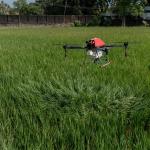Agriculture in Tamil Nadu, a state known for its rich farming heritage, is undergoing a technological revolution with the adoption of drone technology. Traditionally, farmers relied on manual or mechanized methods to spray fertilizers and pesticides, which were time-consuming and labor-intensive. Today, drones are transforming these practices, offering precision, efficiency, and cost savings. This blog explores how drones are reshaping Tamil Nadu’s farming sector, their impact on rural communities, the business models driving adoption, government support, statistical insights, and the challenges and opportunities ahead.
Table of contents [Show]
Adoption and Usage in Tamil Nadu
Tamil Nadu is at the forefront of drone adoption in Indian agriculture, with an estimated 1,500 drones currently in use, representing 25% of the country’s total agricultural drones (Times of India). These drones are primarily used for spraying fertilizers and pesticides on crops like paddy, coconut, maize, and pulses, significantly reducing the time and effort required compared to traditional methods.
Drones can cover up to 50 acres per day, making them a game-changer for large-scale farming operations (TNAU KVK Cuddalore). Districts like Pudukkottai, Coimbatore, Cuddalore, Chengalpattu, Ranipet, Namakkal, and Erode are leading this adoption, supported by demonstrations and training programs.
Coimbatore district with 120 farmers found that drone spraying is the most common application, with educated farmers showing higher awareness and adoption rates (Plant Science Today). This trend is supported by initiatives like the Tamil Nadu Agricultural University (TNAU), which has developed standard operating procedures (SOPs) for drone use across various crops, ensuring effective and safe application (The Hindu).
Benefits for Farmers
Time and Cost Efficiency: Drones drastically reduce the time required for spraying, completing an acre in five minutes compared to hours manually. The cost of spraying has been reduced by up to 50%, as seen in Thangaraj’s case, making farming more economical.
Safety Improvements: By automating spraying, drones minimize farmers’ and laborers’ exposure to harmful chemicals, reducing health risks associated with manual pesticide application.
Precision and Productivity: Drones enable precise application of fertilizers and pesticides, leading to better crop management. Industry estimates suggest a 30% increase in productivity and a 70% reduction in fertilizer, pesticide, and water costs (Times of India).
Addressing Labor Shortages: With labor shortages exacerbated by programs like the Mahatma Gandhi National Rural Employment Guarantee Scheme (MGNREGS), drones provide a practical solution by automating tasks that once required significant manual labor.
Environmental Benefits: Drones reduce pesticide residues in harvested produce by at least 30% and water consumption by 90%, contributing to more sustainable farming practices (TNAU KVK Cuddalore).
Government Support and Schemes
Sub-Mission on Agricultural Mechanization (SMAM): This scheme provides financial assistance for drone purchases. SC/ST, small, marginal, and women farmers can receive a 50% subsidy up to ₹5 lakh, while others are eligible for 40% up to ₹4 lakh. Institutions like Krishi Vigyan Kendras (KVKs) and state agricultural universities can receive 100% of the drone cost (up to ₹10 lakh) for demonstrations (Economic Times).
Namo Drone Didi: Aimed at empowering women, this scheme offers an 80% subsidy (up to ₹8 lakh) for women’s Self-Help Groups (SHGs) to acquire drones, with the remaining cost covered by a 3% interest loan. In 2024-25, 44 SHGs across 28 districts were trained and equipped with drones (New Indian Express).
Training Programs: Since 2021, over 3,500 individuals have been trained as drone pilots by institutions like the Dr. Kalam Advanced UAV Research Centre at MIT, Chromepet, with one-third certified for agricultural drones. The Tamil Nadu Adi Dravidar Housing & Development Corporation has trained 500 pilots, and 15-day training programs for SHG members under Namo Drone Didi include piloting and pesticide application skills.
Regulatory Support: The Drone Rules 2021 and Drone (Amendment) Rules 2022 have streamlined pilot licensing and operations, making it easier for farmers and service providers to adopt drones (Times of India).
Business Models
Uzhavan Mobile App: Launched in 2018 by the Tamil Nadu Agriculture Department, the Uzhavan app connects farmers with drone service providers. With over 1.27 million downloads, the app allows farmers to book drone spraying services, access subsidy information, and receive crop management advice (Hindu Tamil). Drone pilots, including those trained by TAHDCO, use the app to market their services (TNPSC Study Materials).
Self-Help Groups (SHGs): Under schemes like Namo Drone Didi, SHGs are trained and equipped to operate drones, providing spraying services to local farmers. Last fiscal year, 44 SHGs received Kisan drones, with a target of 500 new SHGs this year, monitored by the Tamil Nadu Corporation for Development of Women.
Custom Hiring Centers (CHCs): These centers, supported by SMAM, allow farmers to rent drones and other agricultural machinery, reducing the need for individual ownership. CHCs are established by cooperative societies, FPOs, and rural entrepreneurs, with subsidies covering up to 40% of drone costs (Agro Spectrum India).
Impact on Rural Areas
Labor Shortages: With many rural workers opting for guaranteed wages under MGNREGS, drones fill the gap by automating labor-intensive tasks like spraying.
Economic Benefits: Reduced input costs and increased yields boost farmers’ incomes. For instance, the KVK Cuddalore project aims to double farmers’ income through drone use (TNAU KVK Cuddalore).
Job Creation: Training programs are creating new opportunities for rural youth and women as drone pilots and technicians, fostering economic empowerment.
Community Engagement: Demonstrations by institutions like TNAU and KVKs, such as the one in Vriddhachalam on April 18, 2022, have sensitized farmers to drone benefits, encouraging adoption.
Challenges
High Initial Costs: The cost of purchasing drones remains a barrier for small and marginal farmers, who form the majority in Tamil Nadu.
Technical Complexity: Operating drones requires training, which may be inaccessible to less-educated farmers.
Regulatory Barriers: Compliance with drone regulations, despite recent simplifications, can be daunting for rural farmers.
Accessibility: Small farmers may struggle to access drone services due to limited awareness or availability in remote areas.
Opportunities
Industry Growth: With six of India’s 15 agricultural drone companies based in Tamil Nadu, the state is a hub for innovation. Companies like Garuda Aerospace are leading the way in precision agriculture (Times of India).
Job Creation: The demand for drone pilots and technicians is creating new career paths, particularly for rural youth and women.
Technological Advancements: Research into drone pollination and seed sowing, such as collaborations with Australian universities and efforts by the Tamil Nadu Unmanned Aerial Vehicles Corporation (TNUAV), could expand drone applications.
Sustainability: Drones’ ability to reduce chemical and water usage aligns with sustainable farming goals, supporting Tamil Nadu’s push for eco-friendly agriculture.
Conclusion
The rise of drone technology in Tamil Nadu’s farming sector is a testament to the state’s commitment to modernizing agriculture. With significant government support, innovative business models, and a growing ecosystem of drone companies, Tamil Nadu is poised to lead India in precision agriculture. While challenges like cost and technical barriers remain, solutions like custom hiring centers and training programs are paving the way for broader adoption. As drones continue to transform farming practices, they promise not only economic benefits but also a more sustainable and resilient agricultural future for Tamil Nadu.








